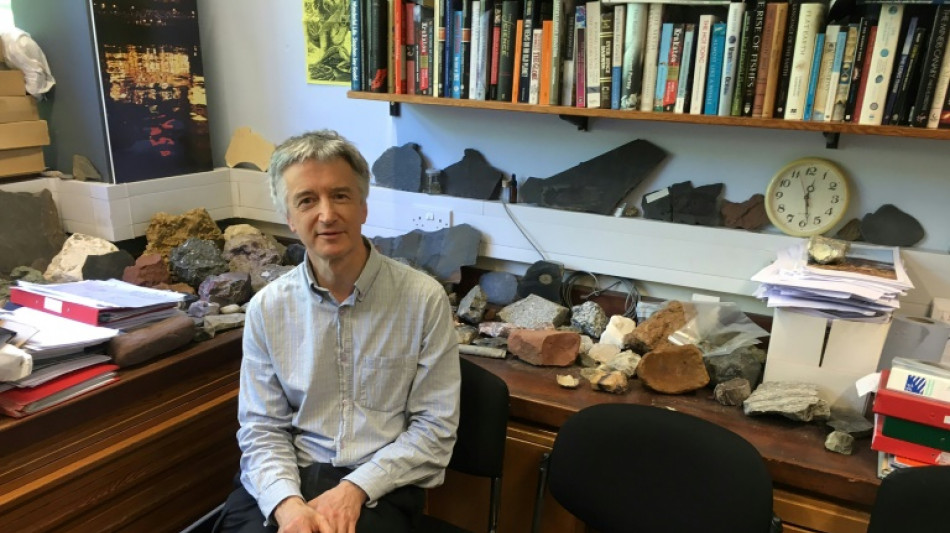
-
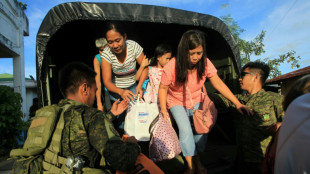 Philippines warns of 'potentially catastrophic' Super Typhoon Man-yi
Philippines warns of 'potentially catastrophic' Super Typhoon Man-yi
-
Wales take on Australia desperate for victory to avoid unwanted record

-
 Tyson beaten by Youtuber Paul in heavyweight return
Tyson beaten by Youtuber Paul in heavyweight return
-
Taylor holds off bloodied Serrano to retain undisputed crown

-
 Japan PM expresses concern to Xi over South China Sea situation
Japan PM expresses concern to Xi over South China Sea situation
-
Tens of thousands flee as Super Typhoon Man-yi nears Philippines
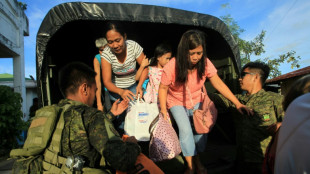
-
 Hoilett gives Canada win in Suriname as Mexico lose to Honduras
Hoilett gives Canada win in Suriname as Mexico lose to Honduras
-
Davis, James spark Lakers over Spurs while Cavs stay perfect

-
 Mushroom houses for Gaza? Arab designers offer home-grown innovations
Mushroom houses for Gaza? Arab designers offer home-grown innovations
-
Gabon votes on new constitution hailed by junta as 'turning point'

-
 Young Libyans gear up for their first ever election
Young Libyans gear up for their first ever election
-
Vice tightens around remaining civilians in eastern Ukraine

-
 Dutch coalition survives political turmoil after minister's resignation
Dutch coalition survives political turmoil after minister's resignation
-
Uruguay end winless run with dramatic late win over Colombia

-
 Max potential: 10 years since a teenage Verstappen wowed in Macau
Max potential: 10 years since a teenage Verstappen wowed in Macau
-
Tens of thousands flee as Typhoon Man-yi nears Philippines
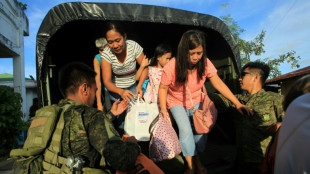
-
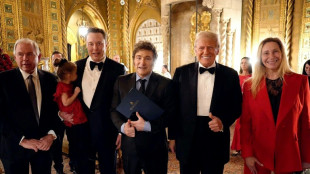 Is Argentina's Milei on brink of leaving Paris climate accord?
Is Argentina's Milei on brink of leaving Paris climate accord?
-
Big Bang: Trump and Musk could redefine US space strategy

-
 Revolution over but more protests than ever in Bangladesh
Revolution over but more protests than ever in Bangladesh
-
Minister resigns but Dutch coalition remains in place

-
 Ireland won 'ugly', says relieved Farrell
Ireland won 'ugly', says relieved Farrell
-
Stirring 'haka' dance disrupts New Zealand's parliament

-
 England's Hull grabs lead over No.1 Korda at LPGA Annika
England's Hull grabs lead over No.1 Korda at LPGA Annika
-
Kosovo players walk off in Romania after 'Serbia' chants, game abandoned

-
 Kosovo players walk off in Romania game after 'Serbia' chants
Kosovo players walk off in Romania game after 'Serbia' chants
-
Lame-duck Biden tries to reassure allies as Trump looms

-
 Nervy Irish edge Argentina in Test nailbiter
Nervy Irish edge Argentina in Test nailbiter
-
Ronaldo at double as Portugal reach Nations League quarters, Spain win

-
 Fitch upgrades Argentina debt rating amid economic pain
Fitch upgrades Argentina debt rating amid economic pain
-
Trump picks Doug Burgum as energy czar in new administration

-
 Phone documentary details struggles of Afghan women under Taliban
Phone documentary details struggles of Afghan women under Taliban
-
Ronaldo shines as Portugal rout Poland to reach Nations League last-eight

-
 Spain beat Denmark to seal Nations League group win
Spain beat Denmark to seal Nations League group win
-
Former AFCON champions Ghana bow out as minnows Comoros qualify

-
 Poland, Britain reach BJK Cup quarter-finals
Poland, Britain reach BJK Cup quarter-finals
-
At summit under Trump shadow, Xi and Biden signal turbulence ahead

-
 Lebanon said studying US truce plan for Israel-Hezbollah war
Lebanon said studying US truce plan for Israel-Hezbollah war
-
Xi warns against 'protectionism' at APEC summit under Trump cloud

-
 Nigerian UN nurse escapes jihadist kidnappers after six years
Nigerian UN nurse escapes jihadist kidnappers after six years
-
India in record six-hitting spree to rout South Africa

-
 George tells England to prepare for rugby 'war' against Springboks
George tells England to prepare for rugby 'war' against Springboks
-
Pogba's Juve contract terminated despite doping ban reduction

-
 Ukraine slams Scholz after first call with Putin in two years
Ukraine slams Scholz after first call with Putin in two years
-
Michael Johnson's Grand Slam Track series to have LA final

-
 Kagiyama, Yoshida put Japan on top at Finland Grand Prix
Kagiyama, Yoshida put Japan on top at Finland Grand Prix
-
Alcaraz eyeing triumphant Davis Cup farewell for Nadal after ATP Finals exit

-
 Xi, Biden at Asia-Pacific summit under Trump trade war cloud
Xi, Biden at Asia-Pacific summit under Trump trade war cloud
-
India go on record six-hitting spree against South Africa

-
 France skipper Dupont says All Blacks 'back to their best'
France skipper Dupont says All Blacks 'back to their best'
-
Trump pressures US Senate with divisive cabinet picks


How the weight of the world fell on one geologist's shoulders
In 1981, newly minted palaeobiologist Jan Zalasiewicz assumed he was headed for a discreet career retrieving and deciphering fossils from Earth's deep past.
For three decades the British scientist was, in his words, an itinerant geologist.
But then, curiosity and happenstance thrust him into the middle of a raging debate within science and beyond as to whether human activity and appetites have tilted our planet into a new geological epoch, the Anthropocene.
Zalasiewicz was tapped in 2009 by the International Commission on Stratigraphy (ICS) -- guardians of the timescale dividing Earth's history into segments such as the Jurassic and Cretaceous -- to chair a working group on the issue.
"I was ambushed by the Anthropocene, and then kidnapped without hope of release," he told AFP in an interview.
The working group has already concluded that the geological record shows a clear rupture in the stability of the Holocene epoch that began 11,700 years ago, and that it occurred around the middle of the 20th century.
Zalasiewicz pointed to an "embarrassment of riches" of evidence locked in ice cores, sediment and coral skeletons: microplastics, forever chemicals, traces of invasive species, greenhouse gases, and the fallout from nuclear bombs.
- Explosive change -
On Tuesday, the Working Group will announce which of nine candidate sites will get the "golden spike" signifying its status as ground zero for the Anthropocene.
Zalasiewicz's 15-years-and-counting Anthropocene odyssey was not what he signed up for.
"When I started geology, it was very much an escape from the complications of the world. You learn to live in the past," he said in an interview.
"Plunging into the Anthropocene, I hit all of this messy, complicated human life," he added. "It's a very abrupt change, and it's not a comfortable one."
But Zalasiewicz only has himself to blame.
Already in the late 1990s, he was intrigued by what human civilisation's fossil record might look like, leading to his first book in 2008, "Earth After Us: What Legacy Will Humans Leave in the Rocks?"
This made him an obvious choice to lead the Working Group, which he did until 2020. He is still a voting member.
For several years, it was assumed that the Anthropocene -- if it was really a thing -- would begin with industrialisation, but the geological markers just weren't there.
Around 2014, however, evidence of what Zalasiewicz called "explosive change" on a global scale concentrated around 1950 began to pour in.
One study in particular showing the planet dusted with fly-ash traceable only to burning coal and oil caught his eye.
"With the new bits of data clustered tightly around the mid-20th century, the Great Acceleration suddenly made sense -- things just clicked," he said.
- Overwhelming evidence -
Two non-geologists invited to join the Working Group -- chemistry Nobel winner Paul Crutzen, who coined the term Anthropocene in 2002, and climate scientist Will Steffen, both recently deceased -- had long championed that theory.
"The geologists were in fact catching up with the Earth system scientists," said Zalasiewicz, now an emeritus professor at the University of Leicester.
Today, Zalasiewicz is clearly worried about whether the Working Group's recommendations will survive the gauntlet of votes required for final validation. He's not optimistic.
"There is deep resistance to the idea of the Anthropocene, including from the most influential and powerful stratigraphers," notably the heads of the ICS and, above that, the International Union of Geological Science, both of whom have been vocal in their opposition, mostly on technical grounds.
"The artillery fire has been and continues to be heavy," Zalasiewicz added. "Validation has always been a long shot."
The concern, he continued, is how a failure to ratify would be interpreted by society at large, where the concept has tapped into a wider conversation about humanity's impact on the planet and what to do about it.
"People will say this is not happening, that the Anthropocene isn't real -- there are dangers involved in that," he said.
"It would give the impression that Holocene conditions" -- which have allowed humanity to thrive for thousands of years -- "were still here, which clearly they are not," he said.
"The weight of evidence for the Anthropocene as a new epoch to follow the Holocene is now overwhelming."
B.Shevchenko--BTB
